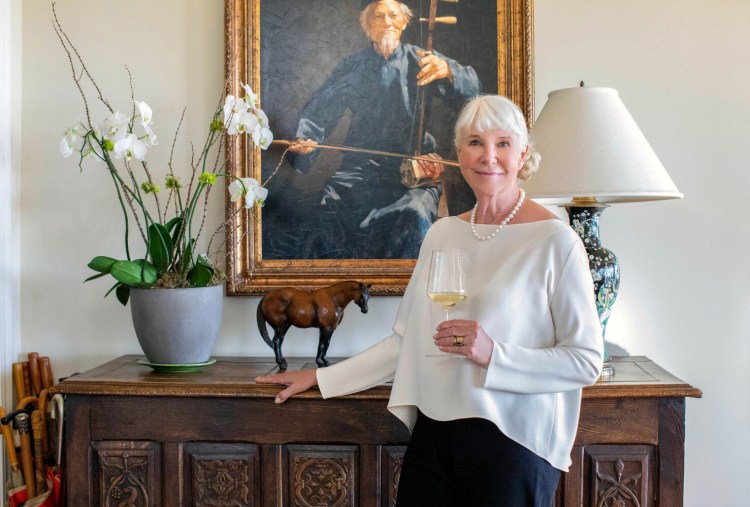The history of Napa Valley wine courses through Robin Lail’s veins. Her great-granduncle, Gustave Niebaum, founded Inglenook Vineyards in 1879 and helped establish Napa Valley’s reputation for quality wine. Her father, John Daniel Jr., expanded that reputation during Napa’s second heyday, after Prohibition. Financial stress forced him to sell Inglenook in 1964 to United Vintners (later swallowed up by Heublein Inc.), ushering in a period of corporate takeovers and declining quality, as Inglenook became a jug wine brand.
Lail, then a young woman pursuing a career in finance, shifted back to wine by working for Robert Mondavi, a catalyst of Napa’s modern revival as a world-class wine region. She helped create Auction Napa Valley in 1981, ushering in an era in which Napa would, for better or worse, become identified with luxury and wealth. She partnered with famed Bordeaux vintner Christian Moueix to create Dominus and cofounded Merryvale winery with Bill Harlan, who went on to personify Napa cult wine with his own label. In 1995, Lail established her own winery, in which her daughters, Erin and Shannon, are partners.
Along the way, she saw Napa survive the phylloxera crisis of the 1990s, when entire vineyards had to be replanted because of an insect infestation. Corporate consolidation continued, as Mondavi took his winery public only to see it swallowed up by Constellation Brands. Other Napa icons – Beaulieu, Sterling, Beringer – also came under corporate ownership. At the same time, movie mogul Francis Ford Coppola wrested ownership of the original Inglenook estate, winery and brand name from the vestiges of corporate control, a story worthy of its own book, if not movie.
Today, Lail sees Napa Valley threatened not by microscopic insects or behemoth corporations, but by Mother Nature herself. The valley – and Northern California more broadly – has been ravaged by wildfires from 2017 through 2020, when the Glass Fire scorched the northern end of Napa Valley and tainted much of the region’s vintage with smoke. In 2019, she signed on with the Porto Protocol, a wine industry group based in Portugal that champions efforts against climate change, promoting the group’s efforts to U.S. wineries.
“I felt I couldn’t just sit in my home and feel scared,” Lail said in a recent Zoom interview from her home in Napa. “I had to do something.”
This year’s vintage conditions posed an existential threat – not just from fires but from drought and excessive heat.
“People used to joke about buying vineyards up north,” she said. “But in June, there were nearly 300 fires in British Columbia. Then we had this heat dome over the Northwest, with temperatures in Portland exceeding 110 degrees. How do we continue to make wine under these conditions? More importantly, how does the wine industry dive into the problem of climate change and do its part?”
Lail likened this to the choices we as individuals can make: composting food waste, solar panels on our roofs, electric cars in our driveways. For Lail Vineyards, it means carbon farming. Cover crops between vine rows, no tilling in the vineyard. No gas vehicles – sheep trim the cover crop in the spring.
“Unfortunately, a carbon-farmed vineyard is not a pretty vineyard,” she says. “We’re not fussing around with it.”
Looking beyond her own vineyards, Lail sees Napa experimenting with grape varieties more suitable to a warmer climate. One of those, she says, may be carignan, a variety once common in Northern California vineyards before cabernet became king. “We had 80-year-old carignan vines at Napanook vineyard in the 1980s,” she says, recalling her early years with Moueix at Dominus. They replaced those vines with cabernet.
From an industry perspective, she sees packaging as wine’s Achilles’ heel. “The biggest carbon drain is in shipping, and packaging – as in, bottle weight – is a big issue,” she said.
Lail has fashioned herself as an ambassador for the Porto Protocol, a spokesperson championing the organization’s climate change work to her U.S. colleagues. Eco-friendly viticulture and other steps to achieve net-zero carbon emissions are her gospel.
There are other climate change efforts by wineries, of course. The Australian wine industry has embarked on an effort to become carbon neutral by 2050. Jackson Family Wines of California and Torres wines in Spain have launched a 10-year initiative called Rooted for Good, aimed at making the wine industry “carbon positive.” Individual wineries are pursuing sustainable, organic, biodynamic and regenerative organic certifications as they implement earth-friendly viticulture. Certified B Corporation wineries incorporate social responsibility efforts as well.
Lail expresses a personal frustration that these efforts against climate change aren’t unified. But she says she hopes the rising chorus will get its message through.
“It was ‘We the People’ who stopped the Vietnam War, a loud voice from the mass of humanity in this country,” she says. “I believe, honestly, that voice in climate change is getting louder and louder.”
Comments are not available on this story.
Send questions/comments to the editors.



